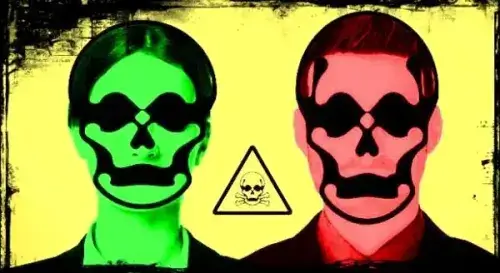Toxic People. In today’s interconnected world, we’re more likely than ever to encounter individuals whose presence drains our energy, extinguishes our motivation, and leaves us feeling worse about ourselves.
Take a moment to look around you whether at your workplace, within your social circles, or even among your own family and you’ll likely spot someone who fits this description.
These individuals, often referred to as toxic people, aren’t born with a biological affliction. Instead, their personalities are molded in a way that makes their interactions with others harmful and destructive.
They can be found in every facet of our lives: they might be a coworker, a friend, a family member, or even a public figure or politician.
Toxic People, Anatomy of a Toxic Personality.
So, how can you spot a toxic person?
Their behavior is often aimed at emotionally or psychologically harming others, frequently with the goal of gaining control or satisfying their own needs at someone else’s expense. Understanding their common tactics is the first step toward self-preservation.
Direct Confrontation and Reality Denial.
Toxic individuals often lash out during direct confrontations, refusing to acknowledge reality or take responsibility for their actions.
Think about the COVID-19 deniers, for example, who, despite overwhelming scientific evidence, stubbornly refused to accept the pandemic’s severity.
This behavior is often a self-preservation mechanism, allowing them to dodge uncomfortable truths or avoid accountability. By creating an alternate reality where they are never at fault, they shift the blame and avoid facing their own flaws.
They might even twist your words, making you question your own memory and perception a classic manipulation technique known as gaslighting.
Malicious Comments and Over-the-Top Reactions.
Toxic people’s comments are frequently laced with malice, designed to provoke an overreaction or simply ruin your mood. Phrases like, “You look great, you finally lost some weight!” or “I hope you have a nice vacation, even though I’d never go there,” are textbook examples of toxic speech.
While they may sound like compliments on the surface, they’re truly meant to plant seeds of discomfort and self-doubt. These remarks are often masked as “honesty” or “being direct,” but they reveal a lack of empathy and a conscious desire to wound.
The true intent isn’t to praise or advise, but to subtly put you down, leaving you feeling off-balance and insecure.
Physical and Mental Deterioration.
The presence of a toxic person can make you feel unwell, both physically and mentally. Their negative energy and destructive actions can cause stress, anxiety, sleep disturbances, and even physical ailments.
Constant exposure to this influence can lead to burnout and serious health problems. Your body and mind are picking up on the threat, and the constant stress response takes a heavy toll.
You might find yourself dreading interactions with them, experiencing a pit in your stomach, or feeling exhausted after a simple conversation.
This isn’t just about bad vibes; it’s a genuine threat to your overall well-being.
Assessing the Impact and Protecting Yourself.
Before you label someone as toxic and cut them out of your life, it’s crucial to carefully evaluate their behavior and how it makes you feel. However, there are some clear warning signs that you need to be cautious and take action.
The Steady Erosion of Self-Esteem.
One of the most potent indicators is a persistent decrease in your self-esteem. Toxic people often use phrases like, “Good luck, because I don’t think you’ll succeed,” or “Do you really think someone like them would be seriously interested in you?”
These direct predictions of failure in your work, relationships, or even concerns about your physical appearance can manifest in various ways through jokes, sarcasm, or mockery disguised as “necessary honesty.”
The common thread is that, instead of offering support, their actions only amplify your fears, confusion, and insecurity. A truly supportive friend would either offer help or assist you in overcoming obstacles, not chip away at your self-worth.
Even if your idea is genuinely difficult to implement, a person with good intentions will point out potential risks without making demotivating comments about you as a person.
Non-Stop Complaints and One-Way Communication.
It’s perfectly normal for people to share their problems. However, if every interaction you have with someone involves listening to an endless stream of bitter complaints, it will inevitably have a negative impact on your well-being.
This kind of one-sided communication is especially damaging when you are merely a passive listener and a “reservoir” for their negative emotions.
This cynical clinginess is the best stimulus for toxic people, as they feed on the attention and sympathy of others without taking any responsibility for their own problems.
They see you as a sounding board, not as a friend, and they will keep coming back to you because you provide them with a constant supply of emotional validation without any demands on their part.
The Manipulator’s Playbook.
Toxic people are often master manipulators, using a variety of tactics to control and influence others. Recognizing these strategies is key to disarming them.
Denying Reality and Their Own Words.
When confronted about a demeaning comment or unfair criticism, they may try to explain it away by saying, “there was no other way,” or “I was forced to do it.”
By twisting the meaning of their own statements and behavior, they challenge your accusations.
At the same time, they intentionally ignore and belittle the feelings of the other person. All of this is done to demoralize the person trying to establish the truth of the situation and maintain their power and control.
They will make you feel like you are overreacting or being too sensitive, subtly shifting the blame back onto you.
The Ever-Raising Bar.
This is one of the more subtle yet destructive tactics. Phrases like, “That’s possible, but is that all you can do?”, “A little more effort and you’ll be a real person,” or “With my help, you can achieve something else in your life,” are designed to create a persistent feeling of inadequacy.
This negative motivation and the vision of an almost-tangible but unattainable reward most affect ambitious but insecure people.
They may have been raised to believe that everything they have is well-earned, but that it’s still not enough. This simple technique is used by toxic bosses, life partners, and even politicians who have forgotten their own past mistakes and failures.
It works until the other person realizes that the reward will never be received because the ever-increasing expectations can’t be met.
Pushing You into the Background.
Paradoxically, this tactic can be the biggest lure for their victims. At first glance, believing in your own uniqueness seems like a sign of strength and self-confidence.
However, if it turns out to be just a “shot” an empty promise or a false facade the consequences will be grim. The toxic narcissist is charming only in the initial phase of a relationship when they want to gain the victim’s trust.
Once they feel the relationship has become closer and the victim is dependent enough, they become more demanding.
Since they need a background against which to dominate, they will do everything to make the relationship with their partner unequal.
A toxic person will constantly undermine their partner’s self-esteem by criticizing and mocking them under the guise of honesty and encouraging greater attachment to ensure their dominant position.
How to Deal with a Toxic Person.
A toxic person robs you of your energy, your desire to act, and creates insecurity and complexes. Do you feel guilty about ending this relationship? This is a good time for a confrontation with yourself and with them.
Set Boundaries.
One of the most crucial steps is to set clear boundaries. If someone constantly oversteps your personal space, it’s vital to say “no” and firmly stick to your decision. This can be difficult because toxic people often try to manipulate others’ feelings to get their way. Don’t let their guilt-tripping or emotional blackmail sway you.
Reduce or End Contact.
If a toxic person is a constant source of negativity and stress in your life, consider reducing your contact with them or even ending it completely if possible.
If, in response to your objections, you hear that your feelings are baseless fears or that you are being overly sensitive, carefully consider whether you want to remain acquainted. There is no need to listen to a toxic person’s “poison speech” from which they gain, but you lose. Your mental and emotional well-being are the priority.
Seek Support.
Talk to trusted friends, family members, or professional counselors about your feelings and experiences. Getting support from others can help you recognize the toxicity of the situation and make decisions that are best for your health and well-being. A third-party perspective can offer valuable clarity and validation.
Focus on Yourself.
Restore your energy and self-confidence by concentrating on your own needs and interests. Engage in hobbies you love, take time for yourself, meditate, or engage in physical activities. Taking care of yourself is vital to recovering from toxic influence and strengthening your resilience. The more you pour into yourself, the less you will need their validation.
Recognize Manipulation.
Understanding the manipulation tactics of toxic people is the first step to protecting yourself from them. By knowing how they try to control and influence others, you can better resist their pressure and maintain your integrity. When you can name the tactic, you can remove its power.
A Final Thought.
The influence of toxic people can be devastating, but by recognizing their signs and learning to set boundaries, we can protect ourselves and our well-being.
Remember that you have the right to respectful and supportive relationships, and you do not have to accept anyone’s destructive behavior.
By learning to recognize and manage toxic relationships, you can create a healthier and happier life for yourself.
Stay mindful, stay strong.




